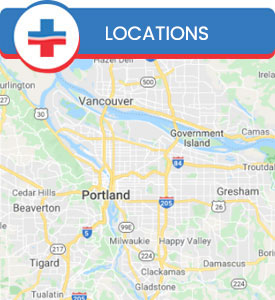Parasitic Infection: Causes, Symptoms & Treatment Q&A
At Columbia Clinic Urgent Care, our team of licensed and experienced healthcare providers will provide you with the treatment you need to alleviate a parasitic infection. Contact us today for more information about our urgent care services, walk-in for a same-day visit, or book an online appointment. We have convenient locations to serve you in 82nd Avenue Portland OR and Mall 205 Portland OR.


Table of Contents:
What is the most common parasitic infection?
What are the first symptoms of parasitic infection?
What causes parasitic infection?
How do you get rid of a parasitic infection?
Parasitic infections refer to any condition that is caused by another foreign organism living, reproducing, and benefiting from your body. While it’s never a good feeling when you hear the word ‘parasite’ brought up in your diagnosis, the good news is that parasitic infections are very common and can be treated quickly and effectively.
Every year, millions of people all over the world get parasitic infections. The three main types of parasites that cause infections in humans are (1) protozoa, (2) helminths, and (3) ectoparasites.
Protozoa are single-celled organisms that can affect a wide variety of areas in your body, including your gut, brain, skin, and blood.
Helminth refers to parasitic worms such as flukes, tapeworms, roundworms, and thorny-headed worms. They can infect the body in both their larval and adult forms, and usually affect the intestinal tract.
Ectoparasites refer to insects and arachnids that attach to your skin, burrow inside, and live there. They typically only infect the part of the body that they’re living in, with the most common forms of ectoparasites being ticks, mites, lice, and fleas.
In general, the most common types of parasitic infections worldwide are:
– Giardiasis.
– Head lice.
– Malaria.
– Pinworms.
– Toxoplasmosis.
The signs and symptoms of parasitic infections can vary depending on which organism has infected your body and what are of the body the parasite resides in. However, the symptoms that are often experienced first are:
– Chronic fatigue
– Constant hunger
– Continuous muscle and joint pain
– Dehydration
– Digestive problems
– Grinding your teeth while sleeping
– Itching and redness around the genital area
– Itching of the anus or vagina
– Nausea or vomiting
– Never feeling full, even after a big meal
– Rashes, eczema, hives, and itching
– Recurrent yeast infections
– Stomach cramps
– Stomach pain
– Swollen lymph nodes
– Unexplained feelings of anxiety
– Weight loss
It’s important to note that symptoms associated with parasitic infections may appear similar the signs associated with other medical conditions. This is why it’s important to consult with a healthcare practitioner, to both rule out other causes and to confirm an actual diagnosis.
Parasitic infections can be contracted by anyone, especially those that are at higher risk due to their environments.
One of the most common ways of contracting a parasite is by consuming a contaminated food or water source, such as eating undercooked meat or drinking water that hasn’t been properly filtered and cleaned.
You can also obtain a parasitic infection by coming into contact with contaminated feces, both human and animal, the likes of which can be spread through unsanitary habits such as not washing your hands properly.
Parasites are more commonly be found in tropical or subtropical regions areas, still water, lakes, rivers, ponds, and soil. So if you’re in regular contact with any of these, you elevate your chances of contracting a parasite.
In addition to these external factors, some people are also more likely to likely to contract a parasite if they have a poor microbiome and/or a compromised immune system.
The vast majority of parasitic infections can only be resolved through specially prescribed medications. These medications may be topical or oral in nature, depending on which type of parasite infection you have. For example, lice are treated with medicated shampoos while ringworms require special a combination or oral medication and topical creams.
Your healthcare provider may prescribe you antiparasitics, antibiotics, or antifungals to treat your infection. Sometimes, you may need to use a combination of medications to alleviate your symptoms and kill of the parasite for good. This will be discussed with you by your provider, who will always take your unique needs and medical history into account before making your treatment plan.
If you have reason to believe you have a parasitic infection or have recently been diagnosed, contact us at Columbia Clinic Urgent Care. Our experienced medical team will get you the treatment you need to get back to feeling your best. Walk in for a same-day appointment or book online to schedule a visit in the future. We serve patients from Portland OR, PDX, Happy Valley OR, Tigard OR, Milwaukie OR, Cedar Hills OR, Cedar Mill OR, Lake Oswego OR, Oak Grove OR, Vancouver WA, Aloha OR, Minnehaha WA, Gladstone OR, Tualatin OR, West Linn OR, Fairview OR, Oregon City OR.


